[Editor’s note: This is the latest in a year-long occasional series of articles produced by InvestigateWest in partnership with The Tyee and other news organizations exploring what it will take to shift the Cascadia region to a zero-carbon economy, and is supported in part by the Fund for Investigative Journalism. Find the whole series here.]
In August, Comox Valley regional director Daniel Arbour floated a proposal that on first listen sounded paradoxical. He suggested removing petroleum sales from the list of allowable uses for an automotive service station. Making gasoline and diesel less convenient, he says, could encourage more people to cut carbon emissions by switching to electric vehicles.
Prompted by Arbour’s thinking, the Comox Valley district instructed staff to consider options for restricting new gasoline and diesel pumps — a strategy that gained traction this year in California after a small town north of San Francisco became the first in the United States to ban new pumps.
British Columbia, Washington and Oregon all have laws that require distributors of motor fuels to steadily reduce the carbon intensity of their products. But biofuels may prove hard to produce in sufficient volume because it is difficult to harvest enough feedstocks, such as wood and vegetable oils, without driving up food costs or degrading carbon-absorbing forests. As a result, Cascadia’s governments are seeking to push drivers into battery-powered cars and trucks as soon as possible and reserve biofuels for heavier vehicles that are harder to electrify.
Arbour’s extra push from his public seat on Vancouver Island is an example of bold local action responding to climate change happening across the bioregion of Cascadia, which includes Oregon, Washington and B.C. Often it’s a matter of local activists fighting for quality-of-life issues teaming up with climate activists and using their collective strength to sway local governments.
Consider the battle waged by the south Seattle neighbourhood of Georgetown to rein in a nearby airport expansion.
“We were here before the airport was. They forget that,” says Rosario-Maria Medina, an activist in the community that sits just north of bustling Boeing Field. When Seattle’s first commercial airport opened in 1928, Georgetown had been a vibrant community for more than half a century.
We’re sitting in the house that once belonged to her grandfather Ismael Barron, who moved from Texas to Georgetown in 1959. Barron joined his brother Manuel, who’d arrived in the 1940s and, like Manuel, set up a barbershop in what was becoming one of Seattle’s most diverse areas. Georgetown and adjoining South Park had significant numbers of Latino, African American, Asian and Pacific Island residents, while the Seattle area remained overwhelmingly white.
Medina, board president for the Friends of Georgetown History, says the Barron barbershops were, for many years, among the only in Seattle that served people of colour. Manuel’s shop was a hotbed of Latino advocacy.
The roar of airplanes punctuates our conversation. To Medina, the sonic interruptions are a persistent reminder of how decades of development practices allowed the airport, industrial facilities and freeways to encroach on the community. By the time her grandfather arrived, the local library and movie theatre had closed, and the completion of Interstate 5 in 1962 killed much of Georgetown’s remaining business activity. “They knew these areas were mostly immigrants and refugees, so they knew they could do what they wanted,” says Medina.
Along with the noise, chemical pollutants rain down on the community. The residential mix of Georgetown and South Park remains diverse: 70 per cent Black, Indigenous and other people of color; 42 per cent foreign born; and 71.7 per cent low income — and they suffer health problems from that pollution. Soot causes a host of heart and respiratory issues, and the toxic lead that causes developmental delays in children is still added to the aviation gas burned by small planes, decades after being banned from North America’s roads.
Emissions of carbon dioxide, meanwhile, dissolve into the atmosphere, contributing to the climate-change-driven heat waves, flooding and other weather extremes that already disproportionately affect marginalized communities.
On this October morning, planes are coming from the north, not just landing a few blocks away at King County International Airport–Boeing Field (the county-owned airport’s full name), but also descending toward Seattle-Tacoma International Airport, or Sea-Tac, the Puget Sound area’s regional airport eight kilometres to the south. We hear passenger jets, corporate jets and cargo jets — United Parcel Service is Boeing Field’s largest tenant — along with the occasional small prop planes.
Medina’s triple-layer windows, mandated to mitigate noise, can’t keep their engines at bay.
In 1999, the Georgetown community lost a fight against a Boeing Field expansion plan. And in 2008, Sea-Tac added a third runway. The noise seems to get worse every year. Takeoffs and landings at the county airfield rose 12.6 per cent between 2015 and 2019.
In response, Medina joined a coalition that’s standing up against further increases in flights — an alliance that’s notched several wins over the past 12 months against one of the region’s core industries. Here and in many spots throughout Cascadia, similar grassroots efforts also are piling up victories.
Local leaders are responding to this pressure — often backed by the rising moral and legal authority of Indigenous tribes and nations — by passing ordinances and implementing rules that deliver on their stated commitments to address climate change and environmental injustice, including rules to phase out gas heating, ban new refineries and chemical plants, and more.
“These rules just change the whole game,” says Matt Krogh, a campaign director for Stand.earth, a climate action group based in Vancouver, B.C. and Bellingham, Washington. Krogh says hurdles to oil, gas and coal developments have more than a practical, legal impact. They also puncture the sense of inevitability that’s surrounded fossil fuel expansion “ever since oil got big” at the dawn of the 20th century.
Communities that ban yesterday’s dirty energy, says Krogh, begin to imagine another “inevitable path” — one toward clean energy: “It’s changing how people are thinking about the future and what’s going to happen.”
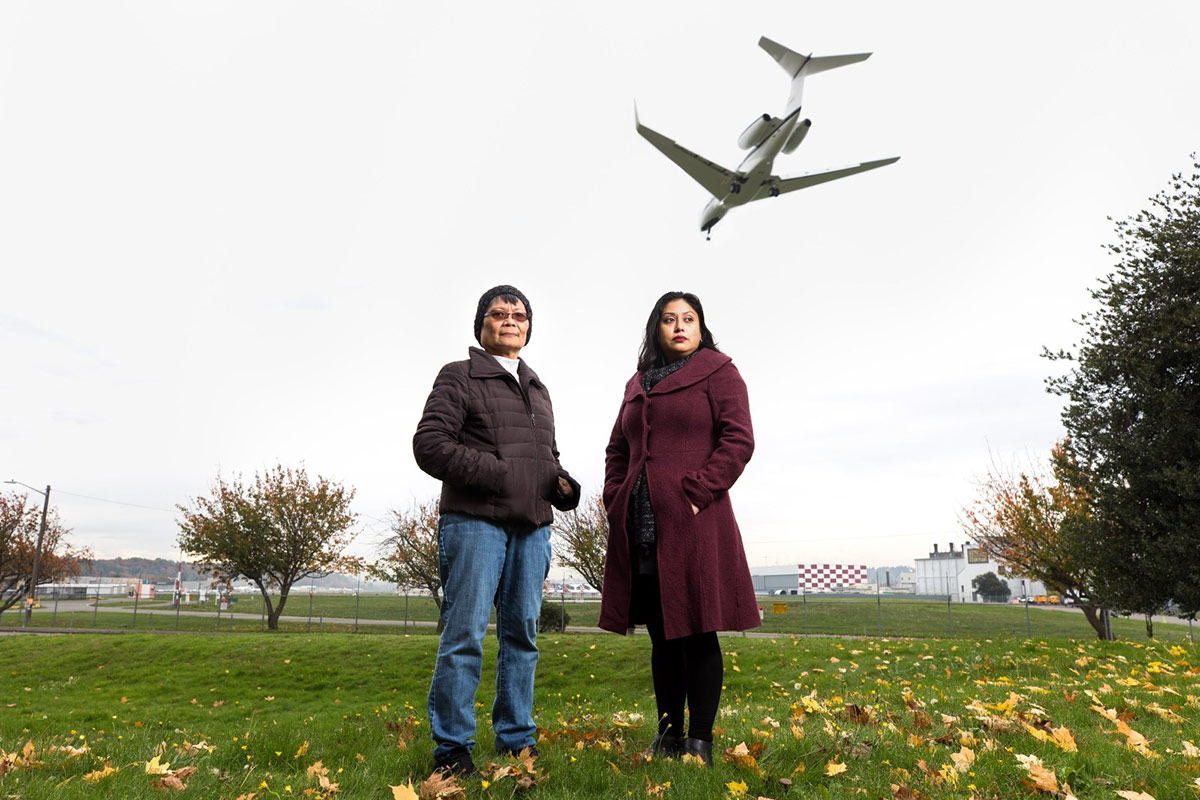
The King County International Airport Community Coalition organized last year in response to a US$282-million master plan update crafted by Boeing Field that foresaw more jet flights and thus more noise in Georgetown, higher emissions of carbon dioxide and, likely, rising air pollution as well. Led by former state representative and labour organizer Velma Veloria, the coalition united groups representing Georgetown and neighbouring communities, such as the Beacon Hill Council, with environmental groups such as 350 Seattle.
The coalition called for the county’s elected officials to fulfil recent promises to fight climate change and environmental injustice by blocking the airport’s expansion.
Veloria carried a powerful message about the health status of those living in the lowlands around Boeing Field: When the Filipina activist left the legislature in 2004, residents had a life expectancy that was five years shorter than people “up the hill” in wealthier Seattle neighbourhoods. “Now, it’s a 13-year difference,” says Veloria. Thanks to earlier advocacy by social justice group El Centro de la Raza and the Beacon Hill Council, the coalition had on hand a Seattle & King County Public Health study on Sea-Tac, documenting its negative health impacts.
Meanwhile, 350 Seattle’s volunteer aviation team helped make the climate connection. Its members documented how aviation generates 2.5 per cent of global CO2 emissions but 3.5 per cent of global warming, thanks to the vapor contrails created by jets, which also trap heat in Earth’s atmosphere.
The coalition and El Centro de la Raza scored its first victory in December 2020 when King County’s elected executive, Dow Constantine, promised that the county’s 2021 greenhouse gas inventory would count emissions from all fuel pumped at airports in the county. Another win came in May, when the county’s updated climate action plan called for cutting aircraft emissions — which Boeing Field’s growth plan anticipated would increase 30 per cent between 2018 and 2035. That could help the county meet its self-imposed mandate to cut emissions 50 per cent from 2007 levels by 2030.
The big win came on the third day of this summer’s heat dome event, at 2:26 p.m. on June 28, when Constantine called Veloria to say the airport’s master plan update was off the table.
Another victory for citizen activists came a few weeks later when Whatcom County, Washington — home to two large refineries — passed sweeping land-use rules that ban new processing plants, such as crude-oil refineries and chemical plants.
There are more bans in the works.
Plastic bag bans are proliferating. Natural gas appliances and furnaces have been banned from certain new buildings in Cascadian jurisdictions such as Vancouver, B.C., Seattle and Multnomah County, which includes Portland. And in May, Eugene, Oregon allowed its gas supplier’s franchise agreement to expire, threatening Portland-based NW Natural’s legal authority to lay new gas pipes under city streets.
States, provinces and national governments are reluctant to push fossil fuels off the table; in fact, B.C. still subsidizes gas production. But a tougher approach is crucial for decarbonization, says Eric de Place, who leads energy policy work for the Sightline Institute, a Seattle-based think tank. Most state, provincial and federal energy policies aimed at addressing climate change provide incentives to build more “clean” stuff, like renewable power plants, low-carbon fuels and electric vehicles. But he sees local action constraining infrastructure as crucial because only less consumption of fossil fuels actually reduces greenhouse gas emissions.
“I’ll be in the bleachers applauding for the clean energy stuff,” says de Place, "but I’ll be in the streets for stopping fossil fuels.”
Wrestling Big Oil to the table
Over more than a decade, Cascadia-centred activism blocked dozens of efforts to turn the region’s ports into facilities exporting coal, oil and gas to the world. That movement, known as the “Thin Green Line," is widely seen as Cascadia’s most effective climate action to date.
Today’s activism marks a pivot. Thin Green Line activists faced a seemingly endless number of fossil fuel export projects. These days, activists are forcing changes in the rules that govern all development in a local area, and it is the fossil fuel industry that finds itself playing whack-a-mole.
It’s no surprise that Whatcom County, immediately south of the Canadian border, is taking a leading role. The county has been fighting the hazards accompanying fossil fuels since a devastating pipeline accident in 1999 in Bellingham, the county seat. A poorly maintained pipeline from the refineries at Cherry Point split and poured more than 200,000 gallons of gasoline into a creek in central Bellingham.
When the fuel ignited, explosions reverberated along several miles of creek, killing two young boys and a teenager, destroying homes and sending up a mushroom cloud. “It looked like an atomic bomb,” recalls Carl Weimer, a longtime resident and former Whatcom County council member.
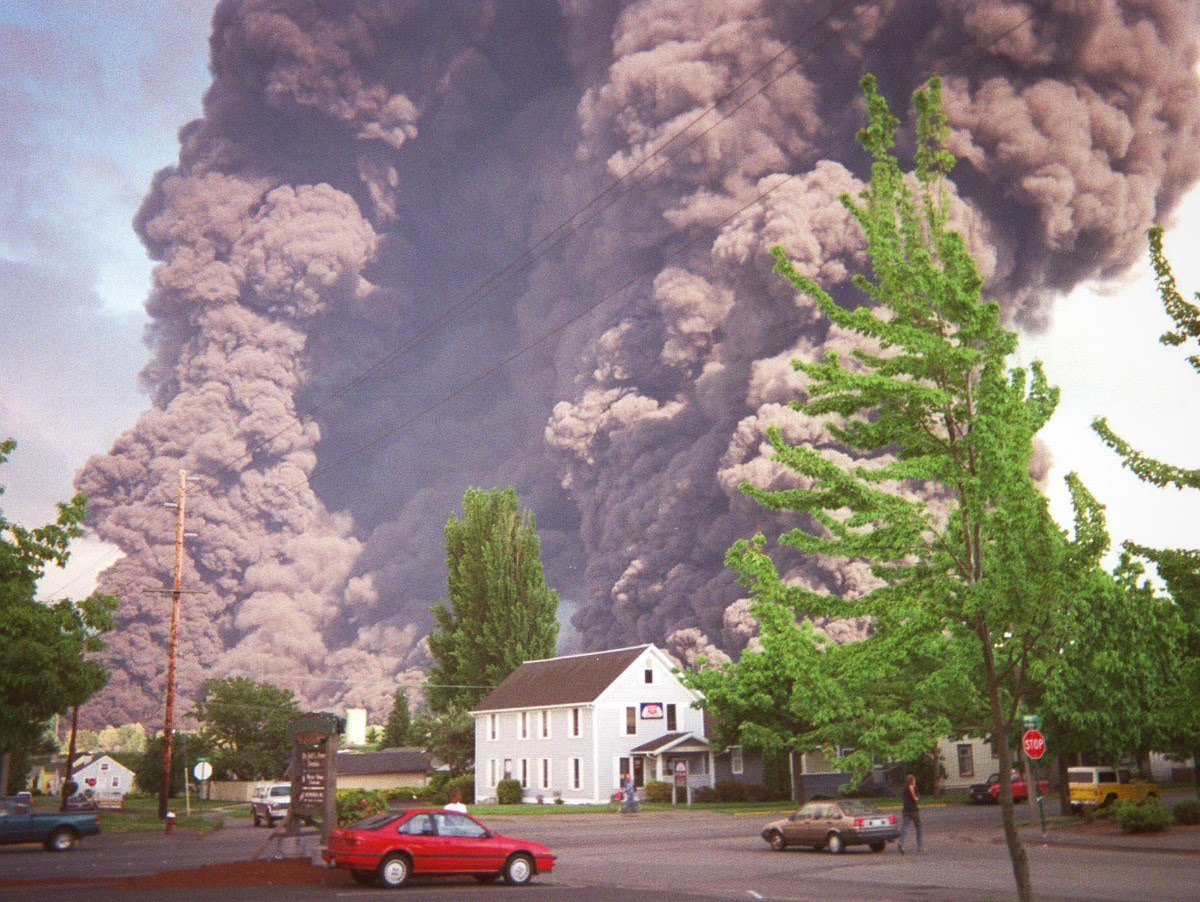
When the pipeline’s owners pushed to quickly patch it and restart, the city — in an unprecedented move — forced them to shut it down. The Olympic Pipeline stayed offline for two years, the longest pipeline closure in U.S. history. And the settlement of more than US$100 million provided funds to launch a national pipeline watchdog.
The Bellingham-based Pipeline Safety Trust, which Weimer ran for years, still drives pipeline safety policy 22 years later. And city residents still remember and discuss the explosion. “That pipeline accident united the community. It didn’t matter if you were a Republican or a Democrat,” says Weimer. “It really did organize people and made them start thinking about fossil fuels and the risks around fossil fuels.”
More recently, Whatcom County’s Cherry Point industrial zone was the site of a major win in Thin Green Line battles that galvanized local environmental activism. That collision pitted environmental activists and the Lummi Nation — whose reservation sits just south of Cherry Point — against a massive coal terminal that threatened the region’s endemic and embattled herring. The fight ended five years ago, when the Lummi convinced federal authorities that the terminal’s 3,000-foot wharf would violate an 1855 treaty that protected the tribe’s right to fish forever in its traditional territories.
That fight led to electoral wins by progressives who used their majority on the Whatcom County Council in 2016 to institute a temporary moratorium on new and expanded fossil-fuel-related industries at Cherry Point.
For the next five years, the moratorium was repeatedly renewed as Cherry Point’s refinery owners, BP and Phillips 66, along with county business groups and unions representing refinery workers, fought attempts to make the bans permanent. They issued studies claiming the rules would hamstring the refineries, costing the county thousands of high-paying jobs. They backed industry-friendly candidates for county council. And they failed.
Tim Johnson, spokesperson for the Phillips 66 refinery, explains that the industry “didn’t feel like our voices were being heard.”
Weimer, who was on the county council at the time, disputes that. He says they invited the industry to work with them to craft rules that wouldn’t hamper improvements to the existing refinery operations. “They would not come and even talk to us. They wanted to play the politics game,” recalls Weimer.
Last year, the refineries finally came to the table. Facilitated by Eddy Ury with Bellingham-based advocacy group RE Sources for Sustainable Communities, a small group of stakeholders that included refinery officials, came to consensus on strong rules crafted by the county’s planning commission. It was the group’s final language that Whatcom County commissioners unanimously approved this summer.
The rules ban a slew of new developments, from crude oil refining and gas-fired power generation to plastics manufacturing, and they create a robust and transparent framework for evaluating whether to accept non-fossil-fuel developments or expansion of existing facilities — a framework that will take greenhouse gas emissions into account.
Activists such as de Place say Whatcom’s vote marks the first time in North America (and maybe worldwide) that a locale with a heavy presence of the fossil fuel industry has permanently prohibited essentially any major fossil fuel development and tightly restricted expansion of existing facilities.
BP and Phillips 66 say they came to the table to ensure that the rules would make it clear that they could maintain and upgrade their refineries and seize an emerging opportunity: refining animal fats and vegetable oils, instead of crude oil, to produce biofuels. These alternative fuels have their own environmental drawbacks, but Cascadia’s governments are banking on them to decarbonize transportation while electric vehicles ramp up in the decades ahead.
BP announced a US$269 million package of investments at Cherry Point less than six weeks after Whatcom’s vote. The investment will more than double its production of renewable diesel to 2.6 million barrels a year — about three per cent of the refinery’s output — and cut the refinery’s carbon emissions by about seven per cent. A corporate statement said the projects would create more than 300 local jobs over the next three years.
Reorienting the City of Destiny
Movements to enforce local limits on new fossil fuel facilities also are unfolding in other jurisdictions, including Vancouver, B.C., Washington state and Portland. Last year, Vancouver became the first jurisdiction in Cascadia to endorse the Fossil Fuel Non-Proliferation Treaty, a pledge to phase out fossil fuel infrastructure that was kicked off in a 2015 declaration by Pacific Island nations threatened by sea level rise. Vancouver’s council motion instructed city staff to seek ways to reduce fossil fuel supply within the city.
In some places, fossil industries are still fighting hard, testing local elected officials who have been exhausted by other issues, such as pandemic restrictions, homelessness, street drugs and crime. The hottest conflict is in Tacoma, where an interim city ordinance akin to Whatcom County’s new rules expires on Dec. 2. Partisans are fighting down to the wire over permanent rules.
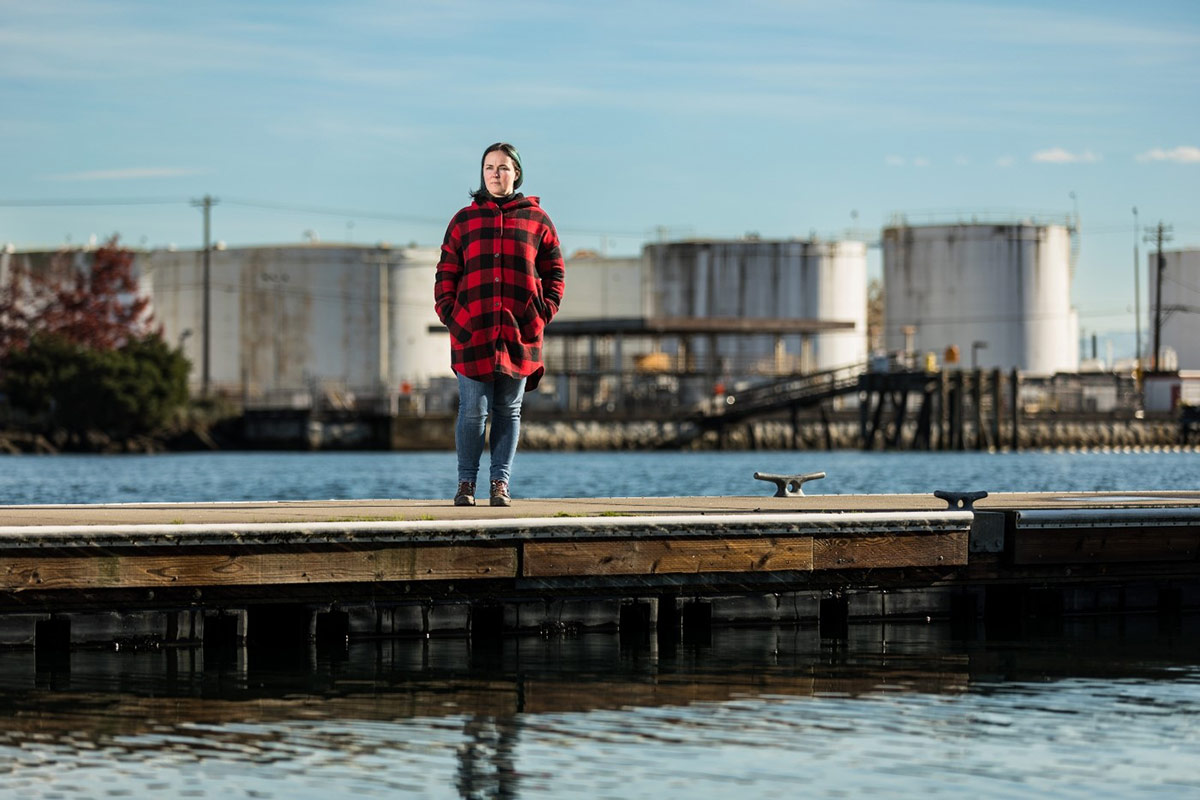
All sides profess support for transforming Tacoma into a production hub for such lower-carbon energy as biofuels or hydrogen produced from electricity. But they are fighting over two key questions: What fuels are clean enough? And must fossil fuel expansion be stopped to secure cleaner investments?
Tacoma’s fight centres on the future of the city’s Tideflats, once an ecologically rich estuary deeded to the Puyallup Tribe in 1854, then steadily stolen from them, filled in and industrialized. That transformation began in 1871, when president Ulysses Grant signed an illegal executive order designating the waters off Tacoma — x̌ʷəlč in the Puyallup’s native tongue, Twulshootseed — as the Pacific terminus of North America’s fifth transcontinental railroad. Thanks to Grant’s treachery, Tacoma beat out Seattle for the rail line and gained the moniker “City of Destiny.”
Polluting facilities grew up around the railroad, among them a large paper mill, whose odour still hangs over the city; a number of shipping operations and fuel terminals; an LNG terminal; and a refinery that processes 42,000 barrels of crude oil daily — increasingly carbon-intensive crude delivered by rail from Canada’s tarsands.
Five years ago, amid bids to add that LNG terminal and other fossil fuel operations on the Tideflats, local activists teamed up to call for a moratorium. The coalition ultimately included environmental organizations, the Puyallup Tribe and cargo-handling longshore workers who were losing work as crude oil shipments clogged rail lines and interrupted grain and container shipments.
In 2017, the Tacoma city council passed a broad, one-year moratorium that’s been rolling over ever since. The interim rules put new industry on hold, but do not prevent existing facilities from expanding.
This spring, Tacoma seemed poised to finalize its Tideflats restrictions. Tacoma’s planning commission proposed rules banning fossil fuel developments and establishing a robust process to evaluate other options, including proposals to produce lower-carbon fuels held up by the interim rules.
Business groups and unions representing trades fought back, conjuring up worst-case scenarios. For example, a community representative from the neighbouring city of Lakewood spread the word that the region’s U.S. military base might shut down because the planning commission’s rules threatened its fuel supply. When asked if the economically important base’s existence is threatened, a spokesperson for Joint Base Lewis-McChord replied concisely, “JBLM is not closing.”
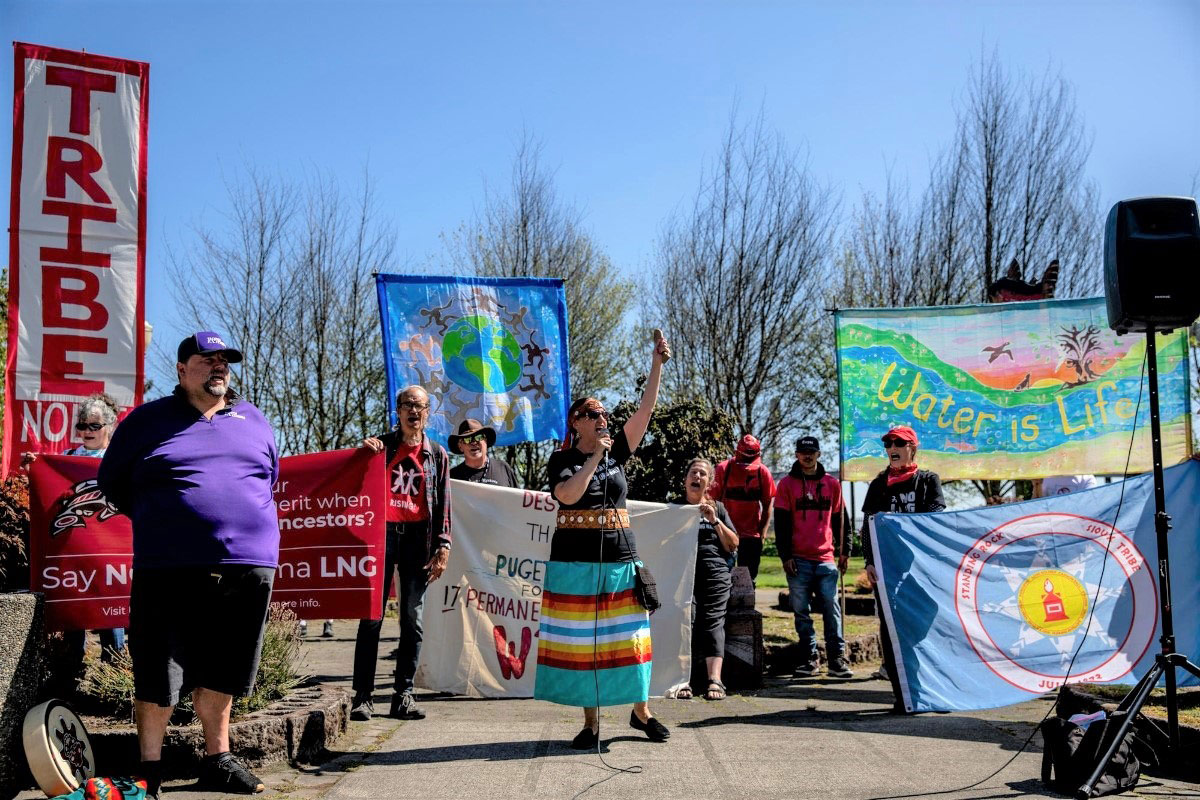
This summer, Tacoma city council committee weakened the commission’s proposed rules, restoring opportunities for fossil fuel growth. The committee’s amendments would allow expanded handling of fossil fuels that Washington state considers “cleaner” than petroleum. This list includes LNG, which is mostly methane, a potent greenhouse gas that causes over 80 times more warming than CO2 during its first 20 years in the atmosphere.
Puget Sound Energy, the Seattle-based utility that’s in the process of starting up the LNG plant, says the weaker rules would allow it to double output from the LNG storage and ship-fuelling facility to 500,000 gallons per day. It says reducing use of bunker fuel to power ships would cut carbon emissions, citing a 2018 finding by the Puget Sound Clean Air Agency based on an outdated 2007 methodology.
International energy researchers, however, say the methane leaks upstream of LNG plants diminish its climate advantage over bunker fuel. An April 2021 World Bank report concluded LNG is a technological dead end, advising governments against “new public policy supports” for maritime LNG.
Melissa Malott, executive director of Tacoma-based environmental group Communities for a Healthy Bay, has poured years of energy into the fight over Tideflats. She now considers the Puyallup Tribe to be the last hope for stronger rules.
The tribe gets a say, thanks to a 1990 land claims settlement that bought out the Puyallups’ title claims to the Tideflats, but also mandated that they be consulted over the area’s ongoing development. Last month, Tacoma Mayor Victoria Woodards delayed council votes until November to allow time to first consult with the tribe.
Tribal Council member Annette Bryan is one of the Puyallups’ go-to speakers on the subject of the Tideflats. Bryan has a master’s degree in civil and environmental engineering and spent a decade as a tribal co-ordinator for the federal Environmental Protection Agency. Bryan says the Puyallups’ message about the Tideflats’ future is clear: There’s zero time for more fossil fuel development, and thus zero room for what she terms the council’s recently inserted “loopholes.”
Revoking fossil fuels’ free ride
Regional activists are busy thinking up new targets, beyond large industrial facilities, to challenge the dominance of fossil energy.
Krogh, at Stand.earth, says many opportunities involve using building codes, land-use ordinances and other measures to restrict the growth of fossil fuel consumption that pervades civic life — or even to start ramping it down.
Widespread examples are local plastic bag bans, such as those in Washington state that led to last month’s statewide ban. Bag bans, which often focus on the potential to slash plastic pollution, can simultaneously constrain demand for plastics. And fossil fuel producers increasingly see plastics as their best hope for future sales of gas, petroleum and coal as the world shifts to renewable power, battery vehicles and all-electric buildings. By one estimate, carbon emissions from the plastic industry could exceed those from coal power plants by 2030.
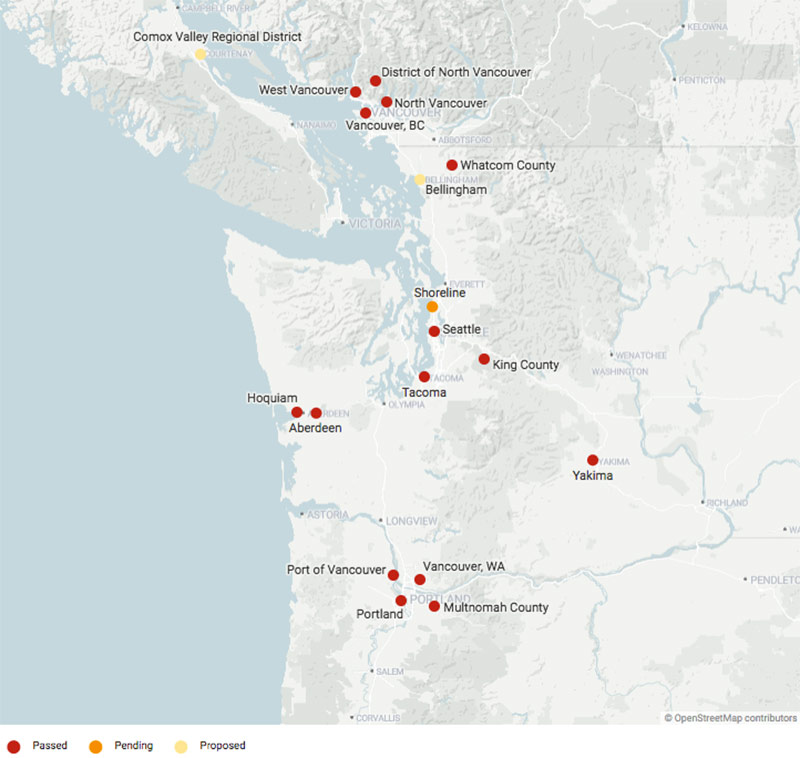
A newer set of battles over the use of fossil fuels seeks to cap the consumption of natural gas in buildings. Bans on gas appliances and furnaces in new construction have passed or are pending in at least nine cities and counties in Cascadia. That’s in spite of heavy regional advertising by the Affordable Energy Coalition, a utility- and labour-backed campaign to protect natural gas heating.
In Seattle, where Boeing Field’s growth plans have been grounded for the time being, activists will face a tougher fight taking on Sea-Tac, a regional hub that is well on the way to completing a growth plan of its own. And Sea-Tac answers to the Port of Seattle, whose enabling statutes enshrine economic growth as a priority.
Activists’ best hope for Sea-Tac may be electing progressive candidates to the port’s independent governing commission. All three of the winning candidates in last week's commission election campaigned on environmental and equity positions, including two women of colour who unseated incumbent commissioners.
On Vancouver Island, where a battlefront lately has become neighbourhood service stations, the person leading the charge emphasizes that it’s crucial to tie the local to the global. Comox Valley regional director Daniel Arbour says his proposal to ban new gas pumps in the area is partly about starting a conversation that connects petroleum use with climate events, such as the heat wave that killed nearly 600 British Columbians this summer.
“We’re trying to do something that might be a little more aggressive and challenging to our usual thinking,” he says. ![]()
Read more: Energy, Travel, Environment, Urban Planning + Architecture


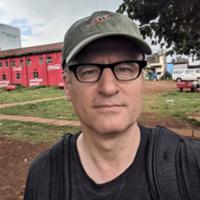













Tyee Commenting Guidelines
Comments that violate guidelines risk being deleted, and violations may result in a temporary or permanent user ban. Maintain the spirit of good conversation to stay in the discussion.
*Please note The Tyee is not a forum for spreading misinformation about COVID-19, denying its existence or minimizing its risk to public health.
Do:
Do not: